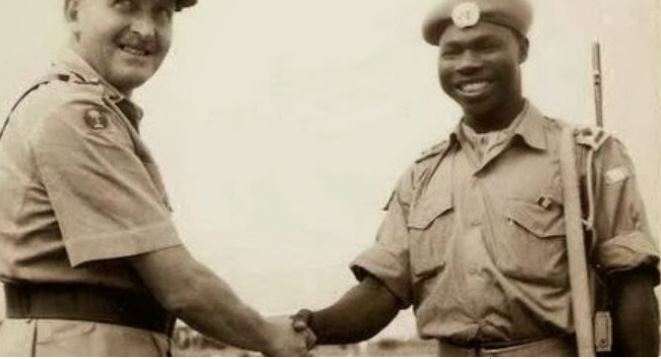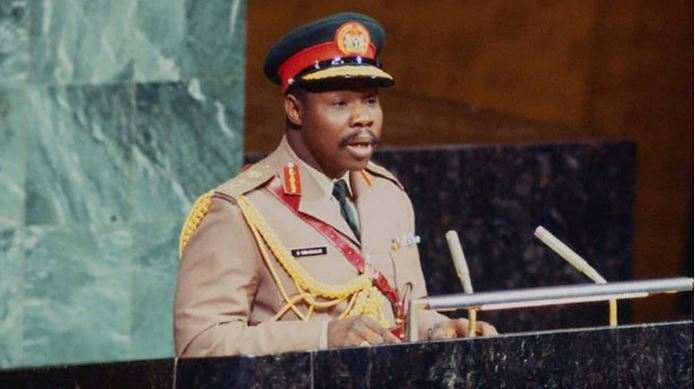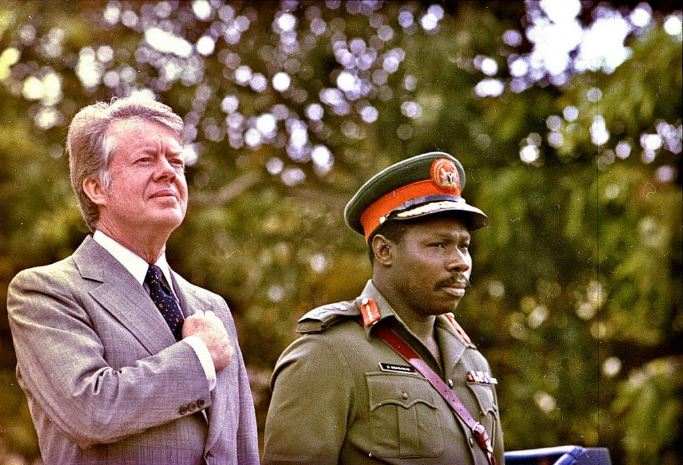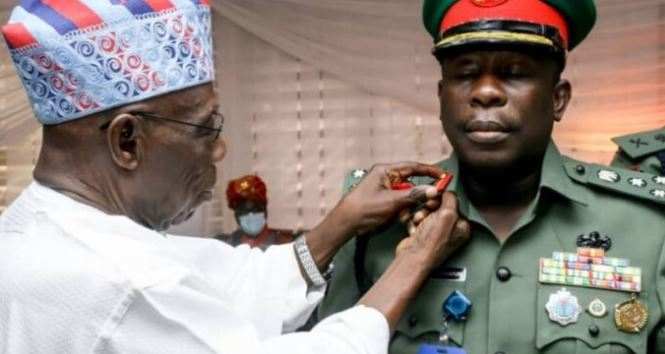
Olusegun Obasanjo Biography
Table of Contents
Olusegun Obasanjo is a Nigerian general, statesman, and diplomat who served as Nigeria’s head of state from 1976 to 1979 and later as its president from 1999 to 2007.
Early Life
Olusegun Obasanjo was born in Ibogun-Olaogun, a village in southwest Nigeria, on March 5, 1937. He was the first of nine children, and only he and a sister survived childhood. Obasanjo was raised Baptist and attended Baptist Boys’ High School in Abeokuta, Ogun State.
He was born into a farming family of the Owu branch of the Yoruba and was educated largely in Abeokuta, Ogun State.
Obasanjo attended Baptist Boys’ High School in Abeokuta and later worked as a teacher. Unable to afford college, he joined the army in 1958 and received officer training in England.
Military career

In 1958, Obasanjo joined the Nigerian Army. He received officer training in England and rose quickly through the army ranks and served in the UN peacekeeping mission in the former Zaire.
In 1967, he was appointed commander of the 3rd Marine Commando Division during the Nigeria’s 30-month Biafran civil war (1967-70) . Obasanjo played a key role in the war effort,
Head of State

In 1975, Obasanjo was appointed Federal Minister of Works and Housing. In 1976, he was appointed Nigeria’s military ruler following the assassination of General Murtala Muhammad in 1976 and became Nigeria’s first military ruler to hand over power to a democratically elected civilian government in 1979.
As Head of State, Obasanjo oversaw a period of economic and political reforms. He also played a key role in the negotiation of Rhodesia’s independence from Zimbabwe.
He was later imprisoned in 1995 for allegedly organizing a coup against General Sani Abacha, who seized control of Nigeria in 1993 and established a repressive military government.

Return to Democracy
In 1979, Obasanjo handed over power to a democratically elected civilian government. He then retired from the army and entered private business.
Following Abacha’s death in 1998, Obasanjo was released from prison and was elected as Nigeria’s first civilian president in 15 years. He was the first democratically elected President in Nigeria’s history from 1999 to 2007.
As President, Obasanjo focused on fighting corruption, improving the economy, combating poverty and establish a democratic system. He also played a key role in the resolution of conflicts in Liberia and Sierra Leone.

Obasanjo’s Legacy
Olusegun Obasanjo is one of the most important figures in Nigerian history. He is a respected statesman and diplomat, and he has played a key role in shaping Nigeria’s democracy.
Obasanjo has been credited for having played a pivotal role in the regeneration and repositioning of the African Union, including his role in the establishment of the New Partnership for Africa’s Development (NEPAD) and the African Peer Review Mechanism (APRM), designed to promote democracy and good governance.
He has also been involved in international mediation efforts in Angola, Burundi, Namibia, Mozambique, and South Africa. Obasanjo has been described as one of the great figures of the second generation of post-colonial African leaders.
He has received praise both for overseeing Nigeria’s transition to representative democracy in the 1970s and for his Pan-African efforts to encourage cooperation across the continent.
However, critics maintain that he was guilty of corruption, that his administrations oversaw human rights abuses, and that as president, he became too interested in consolidating and maintaining his personal power.
Other achievements
- Obasanjo has been awarded numerous honors, including the Indira Gandhi Prize for Peace, the Mo Ibrahim Prize for Leadership in Africa, and the United Nations Peace Prize.
- Obasanjo is the author of several books, including “Africa in the Global Village” and “My Watch: Memoirs of President Olusegun Obasanjo, GCFR, Vol. 1”.
- Obasanjo is married to Titi Obasanjo, and they have four children.

Obasanjo’s major accomplishments as president
Olusegun Obasanjo’s presidency in Nigeria was marked by several accomplishments that positively impacted the country’s political, social, and economic growth. Some of his major accomplishments as president of Nigeria include:
1. Anti-corruption campaign and recovery of looted funds from past and serving government functionaries.
2. Renegotiation and eventual settlement of Nigerian debts.
3. Initiation and execution of projects that positively impacted the lives of Nigerians, irrespective of status.
4. De-politicization of the military and expansion of the police and mobilization of the army to combat widespread ethnic, religious, and secessionist violence.
5. Administrative reforms that accelerated economic growth.
6. Overseeing Nigeria’s first democratic handover of power.
7. Establishment of the New Partnership for Africa’s Development (NEPAD) and the African Peer Review Mechanism (APRM), designed to promote democracy and good governance.
8. Involvement in international mediation efforts in Angola, Burundi, Namibia, Mozambique, and South Africa.
9. Support for the deepening and widening of regional cooperation through the Economic Community of West African States (ECOWAS) and the Co-prosperity Alliance Zone incorporating Benin, Ghana, Nigeria, and Togo.
Overall, Obasanjo’s presidency was marked by significant achievements that helped to put Nigeria on the path of political, social, and economic growth.

Obasanjo’s challenges during his presidency
Olusegun Obasanjo faced several challenges during his presidency in Nigeria. Some of these challenges include:
Corruption: Corruption was a significant problem in Nigeria during Obasanjo’s presidency, and he faced criticism for not doing enough to tackle it.
Political opposition: Obasanjo faced opposition from political rivals, including former Vice President Alex Ekwueme, who challenged him for the ruling party’s ticket in the 2003 general elections.
Ethnic and religious violence: Nigeria experienced widespread ethnic, religious, and secessionist violence during Obasanjo’s presidency, and he mobilized the army to combat it.
Economic mismanagement: Obasanjo faced criticism for his economic policies, which some analysts argued were not effective in addressing Nigeria’s economic challenges.
Military coups: There was a risk of military takeovers during Obasanjo’s presidency, and his military experience helped to keep the balance and prevent coup attempts.
Despite these challenges, Obasanjo’s presidency was marked by significant achievements that helped to put Nigeria on the path of political, social, and economic growth.
Also read: Atiku Abubakar Biography
How olusegun obasanjo addressed ethnic conflict
Olusegun Obasanjo faced several ethnic conflicts during his presidency in Nigeria, and he implemented several measures to address them. Some of the ways he addressed the issue of ethnic conflict during his presidency include:
Proposing a law to ban ethnic militias: In 2002, Obasanjo sent a bill to the federal legislature that would give him powers to ban ethnic militias. This was aimed at curbing the activities of ethnic militias that were responsible for several violent conflicts in the country.
Mobilizing the army to combat ethnic violence: Nigeria experienced widespread ethnic, religious, and secessionist violence during Obasanjo’s presidency, and he mobilized the army to combat it. This helped to restore peace in some of the affected areas.
Promoting unity and national integration: Obasanjo argued for the unity of Nigeria and worked towards promoting national integration. He believed that disintegration would result in successor “weak republics” and that Nigerians would be better off as citizens of a united Nigeria.
Overall, Obasanjo’s approach to addressing ethnic conflict during his presidency was a combination of legal, military, and political measures aimed at promoting peace, unity, and national integration.

The ethnic conflicts that occurred during obasanjo’s presidency
During Olusegun Obasanjo’s presidency in Nigeria, several ethnic conflicts occurred. Some of these conflicts include:
Ethnic violence in the south: Obasanjo’s harsh response to ethnic strife in the south earned condemnation. The conflict was between the Ijaw and Itsekiri ethnic groups in the Niger Delta region, which resulted in several deaths and displacement of people.
Ethnic violence in the north: Most Muslim-dominated states in the north and center of the country adopted Sharīʿah law, which led to several conflicts between Muslims and Christians. The conflict quickly degenerated into an ethnic conflict in South Sudan.
Ethnic militias: Obasanjo accused three ethnic militias of being catalysts of ethnic conflicts. He sent a bill to the federal legislature that would give him powers to ban ethnic militias.
Obasanjo implemented several measures to address these ethnic conflicts, including proposing a law to ban ethnic militias, mobilizing the army to combat ethnic violence, and promoting unity and national integration.
Olusegun obasanjo’s relationship with other african leaders
Olusegun Obasanjo had a good relationship with other African leaders during his presidency. He played a pivotal role in the regeneration and repositioning of the African Union, including helping to establish the New Partnership for Africa’s Development (NEPAD) and the African Peer Review Mechanism (APRM), designed to promote democracy and good governance.
He also supported the deepening and widening of regional cooperation through the Economic Community of West African States (ECOWAS) and the Co-prosperity Alliance Zone incorporating Benin, Ghana, Nigeria, and Togo.
Obasanjo served as chairman of the Group of 77, chairman of the Commonwealth Heads of Government Meeting, and chairman of the NEPAD Heads of State and Government Implementation Committee. He was also involved in international mediation efforts in Angola, Burundi, Namibia, Mozambique, and South Africa.
In 2008, the United Nations Secretary-General, Ban Ki-moon, appointed Obasanjo as his Special Envoy to the Great Lakes region, where he played an integral part in mediation efforts in eastern Democratic Republic of the Congo.
Overall, Obasanjo’s relationship with other African leaders was characterized by cooperation, collaboration, and a shared vision for the development of the continent.
Olusegun Obasanjo educational background
Olusegun Obasanjo was born in the village of Ibogun-Olaogun to a farming family and was educated largely in Abeokuta, Ogun State, and attended Baptist Boys High School, Abeokuta.
After leaving school, he moved to Ibadan, where he took a teaching job. He sat the entrance exam for University College Ibadan, but although he passed it, he found that he could not afford the tuition fees.
In 1958, Obasanjo joined the Nigerian Army, where he specialized in engineering. He spent time assigned in the Congo, Britain, and India, rising to the rank of major.
In India, he studied at the Defence Services Staff College. Later in life, Obasanjo earned a PhD in theology from the National Open University of Nigeria.
Obasanjo’s educational background was largely military, with his training and education focused on military engineering and staff college.
However, he also had a keen interest in theology, which led him to pursue a postgraduate diploma course in Christian Theology at the National Open University of Nigeria.
Who are Olusegun Obasanjo wives?

Olusegun Obasanjo has been married several times throughout his life. His first marriage was to Oluremi Akinlawon in 1963, but they divorced in 1976.
In the same year, he married Stella Abebe in a traditional Yoruba ceremony. Stella Abebe died in 2005. Obasanjo was also married to Lynda, but their marriage ended in divorce in 1998.
In 2009, he married Bola Obasanjo. It is important to note that there have been rumors and false claims about Obasanjo’s marital status, including claims that he has 10 wives and 4 concubines. However, these claims are not true, and Obasanjo has only been married to the women mentioned above.

Olusegun Obasanjo children
Olusegun Obasanjo has about 20 children from different women. Some of his well-known children include Iyabo, Adeboye, Gbenga, Dare, Olubunmi, Damilola, Seun, Olujonwo, Kofo, Funso, Toyosi, Bukola, Busayo, Bisoye, Funke, Segun, Bola, Dayo, Olu, and Kunle.
Oluremi Obasanjo is the mother of six of Olusegun Obasanjo’s 20 children. It is important to note that there have been rumors and false claims about Obasanjo’s children, including claims that he has 21 children and an adopted son. However, the exact number of his children is not clear, and some of his children may prefer to keep their lives private.
Olusegun Obasanjo controversies
Olusegun Obasanjo’s presidency and personal life were not without controversies. Some of the controversies associated with him include:
Third term agenda: Obasanjo’s attempts to change the constitution to abolish presidential term limits were unsuccessful and brought criticism. He was accused of trying to extend his stay in power beyond the constitutionally mandated two terms.
Corruption allegations: Obasanjo faced allegations of corruption during his presidency, and his administration was accused of overseeing human rights abuses. However, he also implemented measures to combat corruption and recover looted funds from past and serving government functionaries.
Ethnic conflicts: Nigeria experienced widespread ethnic, religious, and secessionist violence during Obasanjo’s presidency, and he faced criticism for his handling of the conflicts.
Paternity controversies: There have been controversies surrounding Obasanjo’s paternity, with some people claiming that he is not of Yoruba ancestry. However, these claims are not true, and Obasanjo has dismissed them as false.
Personal life controversies: Obasanjo has been married several times and has had children with different women, which has led to some controversies.
Despite these controversies, Obasanjo’s presidency was marked by significant achievements that helped to put Nigeria on the path of political, social, and economic growth.
Conclusion
Olusegun Obasanjo is a remarkable individual who has made significant contributions to Nigeria and Africa. He is a role model for generations of Nigerians, and his legacy will continue to inspire people for many years to come.
Continue reading: Peter Gregory Obi Biography